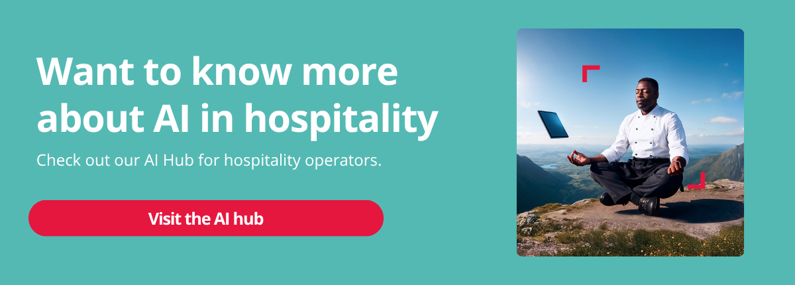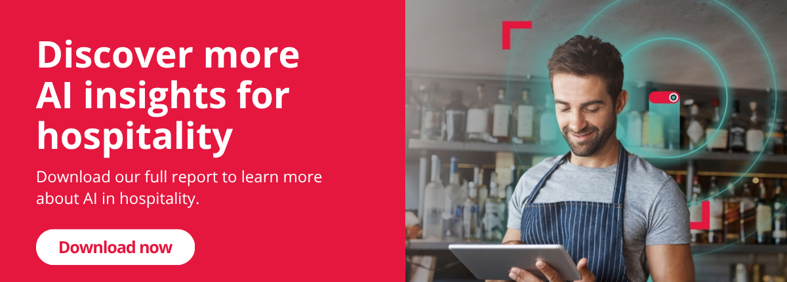
What does AI mean for UK hospitality businesses?
AI in hospitality refers to technologies that help automate tasks, analyse data and personalise service. These include:
-
Machine learning for forecasting and pricing
-
Natural language processing for chatbots and sentiment analysis
-
Predictive analytics for scheduling and inventory
How AI is improving operational efficiency in hospitality
Disconnected systems are one of the biggest operational barriers in hospitality. According to our data, managers spend 286 hours a year switching between platforms and 13% of operational costs are lost due to fragmentation (Source: Access Hospitality AI Report 2025). That’s the equivalent of 36 working days spent navigating siloed systems instead of focusing on service, profitability or team development.
This fragmentation doesn’t just waste time, it undermines decision-making. When data is scattered across EPoS, inventory, scheduling and guest feedback tools, operators struggle to get a clear picture of performance. It leads to:
-
Delays in pricing decisions and rota planning
-
Inaccurate stock levels and missed allergen updates
-
Reactive rather than proactive guest service
AI helps by consolidating data from multiple systems into a single view. Instead of manually cross-checking spreadsheets or toggling between platforms, operators can access real-time insights that support faster, more confident decisions.
For example, AI can:
-
Flag unusual GP% trends across menus and sites
-
Predict staffing needs based on covers, weather and historical data
-
Identify patterns in guest feedback sentiment across channels
-
Recommend stock adjustments based on par levels and upcoming events
This kind of intelligence is especially valuable during peak trading periods, when decisions need to be made quickly and accurately. In fact, 76% of operators say real-time consolidated data would aid faster decision-making during busy shifts, showing how AI can directly improve operational agility (Source: Access Hospitality AI Report 2025).
How AI supports better guest experiences
AI is helping operators personalise service and respond to guest needs more effectively. Examples include:
-
Smart ordering and table recommendations based on guest history and preferences
-
Analysing loyalty and Guest Wi-Fi data to tailor offers and promotions
-
Tracking sentiment across review platforms to identify trends and respond quickly
-
Using virtual tours and smart room features to improve pre-booking and in-stay experience
According to the report, 57% of consumers say technology has significantly improved their hospitality experience, and 35% believe AI could create a better experience than staff. However, 53% still prefer human interaction, highlighting the need for balance (Source: Access Hospitality AI Report 2025).
How AI is transforming marketing and promotions
Marketing teams are using AI to save time and improve campaign performance. This includes:
-
Personalising email and SMS campaigns based on guest behaviour
-
Monitoring social media sentiment to identify brand mentions and feedback
-
Using AI tools to support faster content creation and campaign testing
These tools help operators stay responsive and relevant, especially during seasonal trading periods and busy weekends.
How AI helps with staffing and scheduling
Staffing remains one of the biggest challenges in hospitality. AI is helping operators plan more effectively and reduce costs by:
-
Using predictive analytics to anticipate staff scheduling needs based on data insights
-
Screening CVs to identify top candidates and reduce bias
-
Forecasting labour costs to optimise rotas and control spend
Our AI report highlights the operational impact of data distrust:
-
Managers spend excessive time manually verifying reports
-
Decision-making is delayed while data is cross-checked
-
Opportunities are missed due to lack of confidence in insights
-
Staff frustration and reduced productivity
What are the risks and limitations of AI in hospitality
AI is a powerful tool, but it’s not a replacement for human service. Operators need to be mindful of:
-
Over-reliance on automation, which can reduce personal touch
-
Guest resistance to impersonal service, especially during milestone events
-
Data quality and integration challenges, which can limit AI effectiveness
The best approach is to use AI for routine tasks and let your team focus on creating memorable experiences. As one UK hotel director shared in the Access report:
“There are so many pros to AI. It can move and act quicker than I can possibly imagine. I can never match that. I can never beat that. That, for me, is genius.”
Getting started with AI in your hospitality business
In this article, we’ve looked at how AI is helping hospitality businesses improve efficiency, reduce food waste, personalise guest experiences and support better decision-making. We’ve explored the challenges of disconnected systems, data distrust and staffing pressures, and identified practical ways AI can help.
Many of these challenges stem from fragmented platforms and manual processes. This is where our AI-powered hospitality software, Access Evo is helping operators make real progress. By connecting data across departments, providing real-time insights and supporting collaboration, Access Evo helps hospitality teams reduce admin, improve confidence in reporting and make faster decisions during busy trading periods.

 AU & NZ
AU & NZ
 SG
SG
 MY
MY
 US
US
 IE
IE


